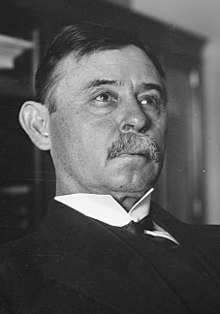Furnifold M. Simmons
| Furnifold McLendel Simmons | |
|---|---|
 |
|
|
United States Senator from North Carolina |
|
|
In office March 4, 1901 – March 4, 1931 |
|
| Preceded by | Marion Butler |
| Succeeded by | Josiah Bailey |
| Member of the U.S. House of Representatives from North Carolina's 2nd district |
|
|
In office March 4, 1887 – March 3, 1889 |
|
| Preceded by | James E. O'Hara |
| Succeeded by | Henry P. Cheatham |
| Personal details | |
| Born |
January 20, 1854 Pollocksville, North Carolina |
| Died | April 30, 1940 (aged 86) New Bern, North Carolina |
| Political party | Democratic |
Furnifold McLendel Simmons (January 20, 1854 – April 30, 1940) was a Democratic member of the United States House of Representatives from March 4, 1887 to March 4, 1889 and U.S. senator from the state of North Carolina between March 4, 1901 and March 4, 1931. He served as chairman of the powerful Committee on Finance from March 4, 1913 to March 4, 1919. He was an unsuccessful contender for the 1920 Democratic Party nomination for president.
As a leader of the state Democratic Party, Simmons led the 1898-1900 White Supremacy campaigns that effectively disfranchised black voters for a half-century. From his Senate seat, he then ran a powerful political machine, using A. D. Watts "to keep the machine oiled back home," in the words of one journalist.
Senator Simmons refused to endorse Al Smith, the Democratic nominee for president in 1928. This, together with the Great Depression, led to Simmons being defeated in the 1930 Democratic primary by Josiah W. Bailey, who was backed by Governor O. Max Gardner.
![]() This article incorporates public domain material from the Biographical Directory of the United States Congress website http://bioguide.congress.gov.
This article incorporates public domain material from the Biographical Directory of the United States Congress website http://bioguide.congress.gov.
...
Wikipedia
